Black History, Events
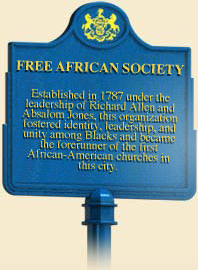 Richard Allen and Absalom Jones formed the Free African Society in Philadelphia, a mutual aid society designed to provide socioeconomic guidance to newly freed people. Among its main objectives were teaching thrift and saving to build wealth in the community. These mutual aid societies and fraternities served as a model for banks later formed in the black community.
Richard Allen and Absalom Jones formed the Free African Society in Philadelphia, a mutual aid society designed to provide socioeconomic guidance to newly freed people. Among its main objectives were teaching thrift and saving to build wealth in the community. These mutual aid societies and fraternities served as a model for banks later formed in the black community.
By the late 1700s there were nearly 2,000 free blacks in Philadelphia. The community had a strong need to establish financial institutions to support businesses and to provide a secure place for accumulating wealth. In 1778, Richard Allen and Absalom Jones, two ministers, founded the first quasi-financial organization in Philadelphia. These leaders understood the connection between saving and investing and economic growth and stability. Within 10 years, the society had a balance of 42.416 pounds on deposit at the Bank of North America. By 1838 the number of benevolent organizations grew to 100, with membership recorded as 7,448.
Similar organizations were established in Boston, New York, Baltimore, and other cities with large black populations. Although these organizations kept their money on deposit at many local banks, by the mid-19th century African Americans found it increasingly difficult to secure credit supporting commerce and industry. In the years leading up to the Civil War, there was extensive conversation about African Americans establishing their own bank.

Black History, Events
 1866 – The Georgia Equal Rights Association First organized.
1866 – The Georgia Equal Rights Association First organized.
1867 – The Georgia Equal Rights Association met in Macon.
Its primary goal was to encourage blacks to register and vote on a new state constitution.
Black History, Events
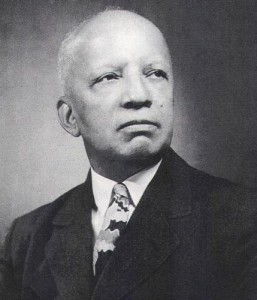
Carter G. Woodson
Historian Carter G. Woodson was born to poor, yet land-owning, former slaves in New Canton, Virginia on December 19, 1875. During the 1890s, he hired himself out as a farm and manual laborer, drove a garbage truck, worked in coalmines, and attended high school and college in Berea College, Kentucky—from which he earned a B.L. degree in 1903.
In the early 1900s, he taught black youth in West Virginia. From late 1903 until early 1907, Woodson worked in the Philippines under the auspices of the U.S. War Department. (more…)
Black History, Events
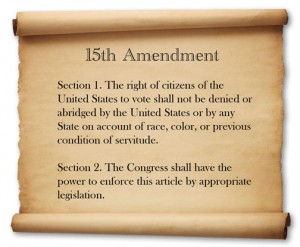 The 15th Amendment to the Constitution granted African American men the right to vote by declaring that the “right of citizens of the United States to vote shall not be denied or abridged by the United States or by any state on account of race, color, or previous condition of servitude.” Although ratified on February 3, 1870, the promise of the 15th Amendment would not be fully realized for almost a century. Through the use of poll taxes, literacy tests and other means, Southern states were able to effectively disenfranchise African Americans. It would take the passage of the Voting Rights Act of 1965 before the majority of African Americans in the South were registered to vote.
The 15th Amendment to the Constitution granted African American men the right to vote by declaring that the “right of citizens of the United States to vote shall not be denied or abridged by the United States or by any state on account of race, color, or previous condition of servitude.” Although ratified on February 3, 1870, the promise of the 15th Amendment would not be fully realized for almost a century. Through the use of poll taxes, literacy tests and other means, Southern states were able to effectively disenfranchise African Americans. It would take the passage of the Voting Rights Act of 1965 before the majority of African Americans in the South were registered to vote.
Black History, Events
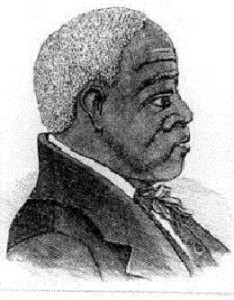
Rev. Andrew Bryan
Andrew Bryan, the founder of the First African Baptist Church, was born enslaved in 1737, on a plantation outside of Charleston, South Carolina. He served as coachman and body servant to Jonathan Bryan, who along with his brother Hugh and several other planters, was arrested for preaching to slaves. Jonathan Bryan’s plantation became the center of efforts by dissenting group of planters to evangelize their slaves.
In 1782, Andrew was converted by the preaching of George Liele, the first black Baptist in Georgia, who was licensed to preach to slaves along the Savannah River. Liele baptized Andrew and his wife Hannah. When Liele and hundreds of other blacks left with the British later that year, Andrew continued to preach to small groups outside of Savannah. With his master’s encouragement, he built a shack for his small flock, which included a few whites. Although he brought hundreds into his church, 350 others could not be baptized because of their masters’ opposition. (more…)
Black History, Events
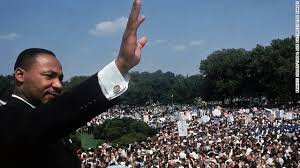
March On Washington 1963
On August 28, 1963, more than 200,000 Americans gathered in Washington, D.C., for a political rally known as the March on Washington for Jobs and Freedom. Organized by a number of civil rights and religious groups, the event was designed to shed light on the political and social challenges African Americans continued to face across the country.
The march, which became a key moment in the growing struggle for civil rights in the United States, culminated in Martin Luther King Jr.’s “I Have a Dream” speech, a spirited call for racial justice and equality.
 Richard Allen and Absalom Jones formed the Free African Society in Philadelphia, a mutual aid society designed to provide socioeconomic guidance to newly freed people. Among its main objectives were teaching thrift and saving to build wealth in the community. These mutual aid societies and fraternities served as a model for banks later formed in the black community.
Richard Allen and Absalom Jones formed the Free African Society in Philadelphia, a mutual aid society designed to provide socioeconomic guidance to newly freed people. Among its main objectives were teaching thrift and saving to build wealth in the community. These mutual aid societies and fraternities served as a model for banks later formed in the black community.
 1866 – The Georgia Equal Rights Association First organized.
1866 – The Georgia Equal Rights Association First organized.


